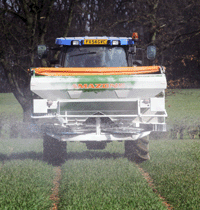Chink of light on setaside replacement

Farm leaders are to hold urgent talks after receiving renewed hope in their bid to stop the government from taking up to 5% of English arable land out of production.
The move came after DEFRA Secretary Hilary Benn told NFU Conference this week he was finally willing to consider voluntary environmental measures rather than a compulsory approach as the government prepared to introduce a replacement for set-aside.
NFU chief economist Tom Hind said the union would now be contacting the Agricultural Industries Confederation as it finalised proposals for a voluntary scheme ahead of a government consultation on the issue, due to launch next month.
“The priority at the moment is to determine how we want the approach we are proposing to appear in the consultation,” said Mr Hind. “That means fleshing out the ideas we have spoken to DEFRA about.”
Proposals for a voluntary initiative have so far focused on three areas. They include the establishment of a farmland bird action plan, which would provide incentives for farmers who created and maintained wildlife habitats on their farms.
Farm leaders are also keen to adapt and improve the government’s existing environmental stewardship scheme might be adapted and improved so that more farmers choose options that benefit farmland birds.
Conservationists and government agencies prefer a compulsory approach to replacing set-aside.
The RSPB said it would need a change of direction from the NFU leadership before being persuaded a voluntary scheme was best.
Industry representatives hope to overcome this opposition by showing their voluntary measures would achieve more than a compulsory approach.
They hope to do this by enlisting cross-industry support from agronomists, consultants and other agricultural advisers.
The Country Land and Business Association said voluntary measures that encouraged the adoption of land management options through stewardship would deliver greater environmental gains than a compulsory approach.
CLA president Henry Aubrey-Fletcher said: “The voluntary alternative would have greater farmer buy-in.” It would deliver better environmental outputs including resource protection, habitat maintenance and creation for a range of wildlife.
